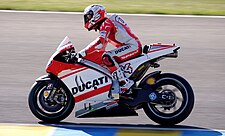

In motorsports, a factory-backed racing team or driver is one sponsored by a vehicle manufacturer in official competitions.
Definition
As motorsport competition is an expensive endeavor, some degree of factory support is desired and often necessary for success.
The lowest form of factory backing comes in the form of contingency awards, based upon performance, which help to defray the cost of competing.
Full factory backing can be often seen in the highest forms of international competition, with major motorsport operations often receiving hundreds of millions of euros to represent a particular manufacturer.
The advantage to this is drivers can get access to expensive prototype parts provided by the company that are not yet available to customers and in the event of their car being too badly damaged to compete, a back-up car will be available to them.
Practice
Grand Prix racing


In Grand Prix motor racing, the most well-established or traditional definition of a works team or factory-backed team is a manufacturer that builds its own car or motorbike including the engine. In a broader sense, it can also be any team that is financed and run by a manufacturer or other business, institution, or organization.
Scuderia Ferrari is a notable example of a works team or factory-backed team in Formula One.
Several factory-backed motorcycle racing and World Rally Championship teams exist.
The creation of the World Sportscar Championship in 1953 changed motorsport deeply and was marked by the establishment of teams like Ferrari, Aston Martin, Mercedes-Benz, and Jaguar, which began to enter multiple factory backed cars or works cars to compete.
Red Bull GmbH entered Formula One in 2005 after creating its own company team Red Bull Racing, and in 2022 had started the development of comprehensive in-house capabilities in order to secure the production of its own powertrains by 2026.
Formula E
In the 2010s, many works teams, also known as factory-backed teams in the context of motorsport, entered the newly created Formula E open-wheel electric motorsport series.
One-make series
One-make series can be backed by the factory, notably Ferrari Challenge and Porsche Supercup, purely to allow themselves sell their competition specials of their models to customers and to organize series.
These series commonly offer prize money and even sometimes a factory drive in an upper-level series.
Lower level racing
In lower level racing, support from dealerships and importers may also be referred to as factory backing.
Drifting
In drifting, where factory backed teams are few and far between (for example, Mopar and Pontiac of Formula D), works team/drivers are those backed by large or highly established tuning companies, as opposed to those entered by the drivers themselves or smaller and less well-off tuning companies.
See also
References
- "F1 2015 team budgets published - but which team spends most?". Crash.net. 9 August 2015. Retrieved 20 February 2024.
- "Mercedes spending accelerates to record £325m". Pitpass.com. 14 October 2014. Retrieved 20 February 2024.
- "Where are Formula 1 teams based? Mercedes, Ferrari, Red Bull and more". Autosport. 5 August 2022. Retrieved 29 August 2023.
- "Mille Miglia Archives". Ferris Cars. Retrieved 29 August 2023.
- Ayles, James (14 January 2020). "From Cliff Diving To Formula One and Football: How Red Bull Built A World-Class Sporting Empire". Forbes. Retrieved 24 January 2024.
- Frye, Andy (5 May 2023). "Horner Shares Secrets To Red Bull's Success". Forbes. Retrieved 24 January 2024.
- "Cassidy ends Formula E season by clinching team championship for Envision". The Independent. 30 July 2023. Retrieved 29 August 2023.
- "London E-Prix: Envision defeats Jaguar to claim Formula E teams' title". Autocar India. Retrieved 29 August 2023.